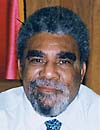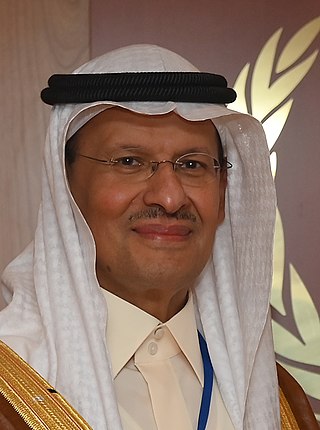Related Research Articles

The economy of Papua New Guinea (PNG) is largely underdeveloped with the vast majority of the population living below the poverty line. However, according to the Asian Development Bank its GDP is expected to grow 3.4% in 2022 and 4.6% in 2023. It is dominated by the agricultural, forestry, and fishing sector and the minerals and energy extraction sector. The agricultural, forestry, and fishing sector accounts for most of the labour force of PNG while the minerals and energy extraction sector, including gold, copper, oil and natural gas is responsible for most of the export earnings.

Sir Mekere Morauta was a Papua New Guinean politician and economist who served as the 7th Prime Minister of Papua New Guinea from 1999 to 2002. Inheriting a depressed economy and a fractious legislature, he embarked on fundamental reforms of the country's economy and political system.
The Ministry of Energy is a Cabinet-level agency of the government of the Canadian province of Alberta responsible for coordinating policy relating to the development of mineral and energy resources. It is also responsible for assessing and collecting non-renewable resource (NRR) royalties, freehold mineral taxes, rentals, and bonuses. The Alberta Petroleum Marketing Commission, which is fully integrated with the Department of Energy within the ministry, and fully funded by the Crown, accepts delivery of the Crown's royalty share of conventional crude oil and sells it at the current market value. The current ministry was formed in 1986, but ministries with other names dealing with energy resources go back to the Ministry of Lands and Mines in 1930.

The Ok Tedi environmental disaster caused severe harm to the environment along 1,000 km (620 mi) of the Ok Tedi River and the Fly River in the Western Province of Papua New Guinea from 1984 to 2013, with the damage still ongoing. The lives of 50,000 people have been disrupted by the disaster. One of the worst environmental disasters caused by humans, it is a consequence of the discharge of about two billion tons of untreated mining waste into the Ok Tedi from the Ok Tedi Mine, an open pit mine situated in the province.

Mining in Papua New Guinea is an important part of the Papua New Guinea economy.

GAIL (India) Limited is an Indian state-owned energy corporation with primary interests in the trade, transmission and production distribution of natural gas. GAIL also has interests in the exploration and production solar and wind power, telecom and telemetry services (GAILTEL) and electricity generation. GAIL was founded as the Gas Authority of India Ltd. in August 1984 under the Ministry of Petroleum and Natural Gas to build, operate and maintain the HVJ Gas Pipeline. On 1 February 2013, the Indian government conferred GAIL with Maharatna status along with 14 other Public Sector Undertakings (PSUs).
Papua New Guinea has exported liquefied natural gas (LNG) since 2014. The LNG sector is important to PNG's economy with US$2.95 billion in exports in 2020, and accounting for 5.25% of the GDP in 2019. On a global scale, PNG is a minor player, with 0.08% of world reserves In 2020, PNG was ranked 16th on the list of gas exporting countries.
Boka Kondra is a Papua New Guinea politician. He was a member of the National Parliament of Papua New Guinea from July 2007 until December 2016, representing the electorate of North Fly Open, variously as an independent, for the National Alliance and for the People's National Congress. He was Vice-Minister for Mining (2011-2012) and Minister for Tourism, Arts and Culture (2012-2016) in the O'Neill government. Kondra was dismissed from office in December 2016 after a leadership tribunal found him guilty of misappropriation charges.
In 2006, Cambodia's mineral resources remained, to a large extent, unexplored. Between 2003 and 2006, however, foreign investors from Australia, China, South Korea, Thailand, and the United States began to express their interest in Cambodia's potential for offshore oil and gas as well as such land-based metallic minerals as bauxite, copper, gold, and iron ore, and such industrial minerals as gemstones and limestone.

Mining is the biggest contributor to Namibia's economy in terms of revenue. It accounts for 25% of the country's income. Its contribution to the gross domestic product is also very important and makes it one of the largest economic sectors of the country. Namibia produces diamonds, uranium, copper, magnesium, zinc, silver, gold, lead, semi-precious stones and industrial minerals. The majority of revenue comes from diamond mining. In 2014, Namibia was the fourth-largest exporter of non-fuel minerals in Africa.
Xtract Resources plc is a diversified metals and minerals producer based in London, United Kingdom. The company's shares are traded on London Stock Exchange Alternative Investment Market. Its CEO is Colin Bird. The primary focus of the company is gold and copper exploration and mining. The company's main assets are located in Chile, Mozambique, and South Africa.

The mineral industry of Peru has played an important role in the nation's history and been integral to the country's economic growth for several decades. The industry has also contributed to environmental degradation and environmental injustice; and is a source of environmental conflicts that shape public debate on good governance and development.
Franco-Nevada Corporation is a Toronto, Ontario, Canada-based, gold-focused royalty and streaming company with a diversified portfolio of cash-flow producing assets. It is traded on the Toronto Stock Exchange and New York Stock Exchange.
Paul Tiensten is a former Papua New Guinean politician and former National Alliance Member of Parliament for Pomio Open. Tiensten is currently serving a nine-year sentence for corruption.
The Kikori Gas Pipeline Landowner Association (KGPLA) is a Papua New Guinea landowner association which received PGK 17.6 million [$6.5 million] in funding in 2009 and 2010 from the government for local infrastructure developments in Kikori, Gulf Province, as part of the benefits the country is receiving from ExxonMobil’s $16 billion Liquefied Natural Gas (LNG) Project in Hides.
The petroleum fiscal regime of a country is a set of laws, regulations and agreements which governs the economical benefits derived from petroleum exploration and production. The regime regulates transactions between the political entity and the legal entities involved. A commercial or legal entity in this context is commonly an oil company, and two or more companies may establish partnerships to share economic risks and investment capital.

The Ministry of Energy is a government ministry in Saudi Arabia and part of the cabinet. It is responsible for developing and implementing policies concerning petroleum and related products. The Ministry of Energy is working to diversify the national energy mix used in electricity production, increasing the share of natural gas and renewable energy sources to approximately 50% by 2030 while reducing the use of liquid fuel.
Roy Biyama was a Papua New Guinean politician. He was a member of the National Parliament of Papua New Guinea from 2002 until his death, representing the electorate of Middle Fly Open. He was a member of four parties: the Papua New Guinea Revival Party, the People's Action Party, the United Resources Party and the People's National Congress. He served as Minister for Higher Education, Research, Science and Technology (2003-2004), Minister for Labour and Industrial Relations (2004-2006) and Minister Assisting the Prime Minister (2006-2007) in the Somare government. He had also been Governor of Western Province since February 2017.
Nixon Koeka Mangape is a Papua New Guinean politician. He was a member of the National Parliament of Papua New Guinea from 2012 to 2017, representing the electorate of Lagaip-Porgera Open.
Sir Charles Lepani, was a Papua New Guinean public servant and diplomat. He was the country's high commissioner in Australia from 2005 to 2017 and, prior to that, had been its ambassador to both the European Union and several European countries.
References
- ↑ MRDC. "About us". MRDC. Archived from the original on 2012-01-13.
- ↑ "Govt terminates MRDC chief". Papua New Guinea Post-Courier. 13 October 2011. Archived from the original on 16 April 2013.
- ↑ "PNG Government terminates contract of MRDC boss". Islands Business. 13 October 2011.
- ↑ MDRC. "History". MDRC. Archived from the original on 2012-01-22.
- 1 2 "MRDC denies corrupt deals report". Papua New Guinea Post-Courier. 29 September 2011. Archived from the original on 16 April 2013.
- ↑ Post Courier. "PM orders probe into MRDC". Post Courier. Archived from the original on 2012-09-10.